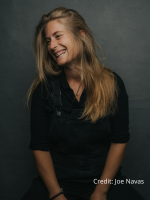When we think of bees, most of us think of fields, farms, and honey. But many of our native bee species don’t make honey and the plants they pollinate live not just in fields or on farms but also in swamps and forests. Kristin Andres is the Associate director of education and outreach for the Association to Preserve Cape Cod and she says we have a lot to learn about our 770 species of native eastern North American bees.
"One of the cool things to learn about our native bees is that many of them live above ground, some live below ground, and the majority of them are solitary nesters."
This means that unlike European honeybees, which live with thousands of bees in a hive, most native bees live alone. They emerge from the ground in the spring, mate, and lay their eggs in hollow reeds or ground tunnels and then they die. And 25 percent of our native bee species specialize in a specific type of pollen.
"So they have particular plants that they need it’s the only pollen that they can feed their young but they also have evolved with these plants so they have special abilities to carry the pollen," she says. "For instance, the squash bees are able to carry the pollen from squash in pumpkins because they have on their scopa they have hairs that are far enough apart to carry the big pollens."
There are three species of squash bees in eastern North America, and studies show they are much more effective than honeybees at pollinating summer squash, winter squash, zucchini, pumpkins, and other gourds. While these squashes were first cultivated in the Andes and Mesoamerica, native people brought them north and have been growing them in our area for thousands of years, so the bees followed.
"If it’s the plant that they need for their life cycle, they’ll be there. And there are also bees that specialize, little bees that specialize with blueberries, so it’s that whole family, so it’s bearberry, low bush blueberries, high bush blueberry, and huckleberry," Kristin explains. "And those are plants that we take for granted when we look through our forests here on Cape Cod because we don’t have a lot of diversity but they’re very important plants to our whole forest ecology."
In fact, in most local forests, these plants make up the bulk of the understory. There are 10 species of native bees that specialize in pollinating this berry genus, vaccinium which also includes cranberries. Many of the native bee species that specialize in vaccinium plants visit more flowers per minute and deposit more pollen per minute than honeybees do and these native bees are willing to forage when it’s chilly and damp — which as we all know it often is here in the spring.
Specialist native bees also pollinate other important native crops — foods like lettuce, sunflower seeds, Jerusalem artichokes, safflowers, chicory, sweet potatoes, ground cherries, and tomatillos. Kristin says it’s important to remember that honeybees aren’t the only species worth saving.
"Save the bees is really more about saving our wild bees, because one in four of our bee species in the U.S. is at risk of extinction and there’s so much we don’t know about our wild bees."
There are so many cool things people are just starting to study about our native bee species. For instance, some researchers in the southeastern U.S. found in 2021 that prescribed burning can improve nesting habitat for ground-nesting bees. And plants we don’t usually think of as having flowers — like maple trees — are actually important food sources for these bees when they first emerge in the early spring. Beyond the campaign to save the bees which by now most of us are aware of, it’s also time to celebrate these species. They have so much to show us about this place we live in and what it needs to thrive.
—
Here is a link to a blog post about the native bees study from Wellfleet Bay Wildlife Sanctuary.
Learn more about eastern native bees here.
—
This piece first aired in May 2022.








